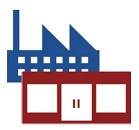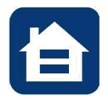Facilities Covered by the ADA
State and Local Government Facilities

Units of government at the state, county, and local levels are subject to the ADA and must comply with the ADA Standards in new construction and alterations. All types of public facilities are covered, including schools, hospitals, public housing, courthouses, and prisons. Federal facilities are not covered by the ADA, but by an earlier law, the Architectural Barriers Act (ABA) and must meet separate, though very similar, standards.
Places of Public Accommodation and Commercial Facilities

In the private sector, the ADA Standards apply to places of public accommodation and commercial facilities. Places of public accommodation are facilities that affect commerce and that fall within twelve categories listed in the statute, including stores and shops, restaurants and bars, sales or rental establishments, service establishments, theaters, places of lodging, recreation facilities, assembly areas, private museums, places of education, and others. Nearly all types of private businesses that serve the public are included in the twelve categories, regardless of size. Commercial facilities include office buildings, factories, warehouses, manufacturing plants, and other facilities whose operations affect commerce.
Transportation Facilities

Bus stops and stations, rail stations, and other transportation facilities are required to be accessible by the ADA. The ADA also establishes standards for transportation vehicles, including buses, vans, and rail cars (which are not discussed in this guide).
Exemptions (Religious Entities and Private Clubs)
The ADA does not apply to religious organizations and private clubs, entities which historically have been exempt from federal civil rights laws. Places of worship and other facilities controlled by a religious organization, such as a school or day care center, are not subject to the ADA Standards. Private clubs may be similarly exempt depending on their exclusiveness, operations, and other factors. Facilities not subject to the ADA Standards may still be subject to state or local access codes.
ADA Coverage of Housing
Although private residential housing is not covered by the ADA, government-owned or operated housing and certain privately owned facilities that provide housing are subject to the ADA and its accessibility requirements. Government owned or operated facilities may include public housing, student and faculty housing, employee housing, nursing homes, temporary housing provided in emergencies, and social service facilities, such as homeless shelters and halfway houses.

In the private sector, the ADA’s coverage of housing is limited to places of public accommodation, such as social service establishments and housing provided on or behalf a place of education. The ADA does not apply to individually owned or leased housing in the private sector not used as a public accommodation, including single family homes, condominiums, or apartments. (Many types of multi-family housing in the private and public sectors are subject to the design requirements of the Fair Housing Act.) Places of public accommodation located in residential buildings, such as rental and sales offices, commercial spaces, and hotel accommodations, are covered by the ADA Standards. Information on the Fair Housing Act is available from the Department of Housing and Urban Development at http://www.hud.gov/ or http://www.fairhousingfirst.org/,(888) 341-7781 (V/TTY).

User Comments/Questions
Add Comment/Question